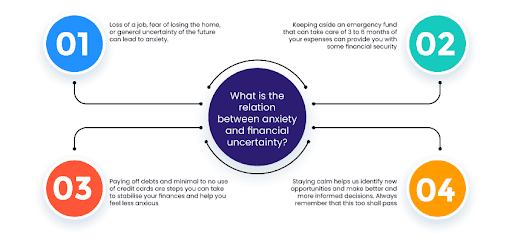Introduction
No one had predicted that the global lockdown during the COVID pandemic would continue for so long. Innumerable people lost their jobs. Small businesses closed down, and consumer spending decreased, which forced even the more prominent players in the market to cut down production and lower their strength of employees. Moreover, investment in real estate reduced markedly. All this resulted in a recession in the global economy.
Once again, we are getting back on our feet, and the picture is getting brighter daily. However, the cross-country war is adversely affecting the economy.
Financial uncertainty is the #1 cause of anxiety in today’s competitive world, and we must learn to cope with it to maintain our mental health and enjoy life under every circumstance. The following guide gives some implementable steps in dealing with anxiety caused by financial uncertainty.
Our Wellness Programs
What is a recession?
A recession is a significant decline in economic activity lasting more than a few months. However, economists consider it a recession when there is a drop in real G.D.P. (gross domestic product) for two consecutive quarters or more. A recession typically involves a fall in employment, an unemployment rise, and an inflation slowdown.
Looking for services related to this subject? Get in touch with these experts today!!
Experts

Banani Das Dhar

India
Wellness Expert
Experience: 7 years

Devika Gupta

India
Wellness Expert
Experience: 4 years

Trupti Rakesh valotia

India
Wellness Expert
Experience: 3 years

Sarvjeet Kumar Yadav

India
Wellness Expert
Experience: 15 years

Shubham Baliyan

India
Wellness Expert
Experience: 2 years
How do we know if we are in a recession?
There are many indicators that economists look at to determine whether an economy is in a recession. These include things like G.D.P., employment, inflation, and retail sales. If these indicators show signs of decline, the economy will likely be in a recession.
What causes a recession?
However several factors can lead to a recession. One of the most common causes is a decrease in consumer spending. When consumers spend less, businesses make less money and thus have to cut back on production and hiring. It can lead to a vicious cycle where the economy spirals downward. Other causes of recessions include natural disasters, oil shocks, and financial crises.
A recession can have several effects on an economy. One of the most visible effects is an increase in unemployment. As businesses cut back on production, they often lay off workers. It can lead to poverty and crime as people struggle to make ends meet. A recession can also cause a decrease in investment and consumer confidence, further damaging the economy.
How do we deal with anxiety caused by financial uncertainty or recession?
Dealing with anxiety caused by financial uncertainty or recession can be difficult, but there are a few things we can do to help ease our worries. Here are some tips:
- We should not blame ourselves for the current financial downslide in our life. It does not make us a failure. Look around, and we can find many dealing with a similar situation. Our attempts at working through this financial crisis only show our strength.
- Hence if we are concerned that lack of money can disrupt the harmony in our family, we might be wrong. A family that fights the challenges together always emerges stronger. Derive strength from each other during these trying times.
- Create a budget and stick to it. Financial anxiety can be caused by not knowing where our money is going. Creating a budget can help us handle our finances and feel more in control.
- There is no shortage of success stories of people who have risen from bankruptcy to becoming the owners of enormous business empires. Reading these motivational stories will instil hope and positivity in you.
- However, if you keep a positive attitude, you will discover that everything is not wrong with the recession. It may open up new avenues, making you even more successful. You can upgrade your skills with the help of several online courses that are free or available at minimal fees. These skills can help you start your own business or land a great job.
- Hence stay calm and focus on what you can control, such as your spending and saving habits. Because a recession can lead to better financial habits and gratitude, which will come in handy even after this lousy phase.
- Firstly, talk to someone who understands what you’re going through. Talking to people who love us can help relieve some anxiety. They can even suggest to us ways to improve our financial situation. It will help you feel positive and give you strength.
- Seek professional help. If your anxiety is severe, seek professional help. A therapist can help you learn coping mechanisms and provide tools to deal with stress.
What is the relation between anxiety and financial uncertainty or recession?

There is a strong link between anxiety and financial insecurity.
- Money troubles can cause significant stress, leading to anxiety. Similarly, pressure can make it difficult to manage money properly, leading to financial problems. It creates a vicious cycle in which stress and economic insecurity feed off each other.
- Loss of a job, fear of losing the home, or general uncertainty of the future can lead to anxiety.
- Keeping aside an emergency fund that can take care of 3 to 6 months of your expenses can provide you with some financial security.
- Paying off debts and minimal to no use of credit cards are steps you can take to stabilise your finances and help you feel less anxious.
- Staying calm helps us identify new opportunities and make better and more informed decisions. Always remember that this too shall pass!
Conclusion
However, a recession can negatively affect mental health in several ways. For that reason, the stress of worrying about money can lead to anxiety and depression. Additionally, the loss of a job or a home can cause feelings of grief and hopelessness. Though financially uncertain times are difficult for everyone, it is essential to stay positive. At that moment, one of the best ways to do this is to focus on what you can control. Write down your expenses, even the smallest ones, and determine where some cuts are possible. It is important to always end with a solution that empowers us and controls the situation.
| [1] | M. K. Forbes and R. F. Krueger, “The Great Recession and mental health in the United States,” Clin. Psychol. Sci., vol. 7, no. 5, pp. 900–913, 2019. |
| [2] | A. L. Bronzaft and S. B. Dobrow, “Test anxiety and the economic recession,” Psychol. Rep., vol. 38, no. 3 Pt 2, pp. 1211–1215, 1976. |
| [3] | L. J. Christiano, M. S. Eichenbaum, and M. Trabandt, “Understanding the great recession,” Am. Econ. J. Macroecon., vol. 7, no. 1, pp. 110–167, 2015. |















